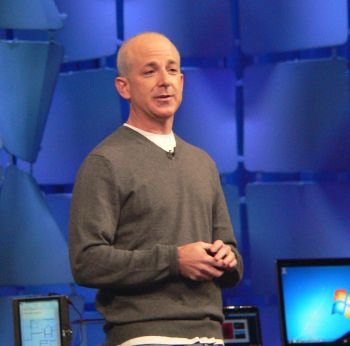
Spectrum crisis is just a part of the problem for universal broadband, says FCC
Early in October, Federal Communications Commission chairman Julius Genachowski said there is a wireless spectrum crisis approaching, and that our wireless broadband consumption is growing so explosively that it would take more than 50 years to deliver the necessary spectrum at our current pace.
But an FCC task force has concluded that this is only a single part of the problem if we want to provide America with robust and affordable broadband. Over the last few weeks, the task force has identified critical gaps in policymaking, government programs, and trade practices in all corners of the broadband ecosystem.

Microsoft gives free laptops to PDC 2009 attendees
Windows 7 took the Professional Developer Conference stage this morning in the guise of Steven Sinofsky, president of Microsoft's Windows & Windows Live division. Sinofsky stood before the crowd of Microsoft developers as a victor. Last month, his team released Windows 7 nearly flawlessly and to generally positive reviews (PDC Day 2 live blog).
Sinofsky did not pitch a three-screen strategy -- PC, TV and mobile device -- as I expected based on statements Ray Ozzie, Microsoft's chief software architect, made during the Day 1 keynote. For PDC, Microsoft is missing one screen. The company doesn't plan to announce its next-generation Windows Phone -- or Windows Live, for that matter -- until next year's MIX conference.

Nokia's N900 arrives in U.S., bodes the death of Symbian on N-series phones
Nokia's intriguing N900 "pocket computer" has officially launched in the United States. The device, a smartphone that evolved out of Nokia's Mobile Internet Device (MID) family, signifies a new era for the Finnish mobile tech leader.
Vice President of Nokia retail sales, Alessandro Lamanna summed it up in a prepared statement today: "Consumers from every segment of the population are looking for more out of their mobile device - more power, more ability, more connectivity." So in order to deliver these results, Nokia paired the 600MHz TI OMAP 3430 chipset with the Linux-based Maemo platform, and locked it up inside a 3G phone with a 3.5" touchscreen and QWERTY keyboard.

PDC 2009: Live from the Day 2 keynote
Microsoft's Windows division president Steven Sinofsky is the headliner for today's Day 2 keynote at PDC 2009, and Betanews has its usual front-row seat.
11:04am PT: Promise of discussion on Windows Mobile at MIX '10 next March 15-17 in Las Vegas -- notice once again that the number "7" is omitted from the reference to this product. Keynote ends 35 minutes over schedule.

Beta of Opera 10 for Windows Mobile available now
Today, Opera Software has released the beta version of Opera Mobile 10 for Windows Phones, with support for touchscreen- and keypad-driven Windows Mobile 5 (PPC), 6.0, 6.1, and 6.5 devices.
The keywords with this release are: speed, simplicity, and compatibility.

PDC 2009: Windows Server's plan to move customers back off the cloud
Much of the value proposition for Windows Azure -- the star of the show Tuesday at PDC 2009 in Los Angeles -- has been its ability to open up new business avenues for customers who had not been able to envision hosting high-intensity data center operations before. Azure could give these customers a leg up, a new and more affordable way to get off the ground.
But once they're off the ground, the question becomes, why stay up in the air? What's to keep those customers grounded -- to mix metaphors like an old editor of mine -- in the cloud? The surprise answer to that question is coming from a senior product manager for Windows Server, not Azure. Scott Ottaway told Betanews today that provisions are being planned for customers to move their deployed applications back off the Azure cloud, onto on-premises data center servers.
With YouTube Direct, now users can yank videos from big media
Google today announced YouTube Direct, an open source platform that lets media organizations directly connect with YouTube users to request and rebroadcast their YouTube clips.
The application allows custom YouTube uploaders to be built into another site, so users can submit their videos directly and track the viewing metrics in their own profile. Google highlights the rise of citizen journalism as a major reason for the program.

PDC 2009 Day 1, post-keynote: What are we learning so far?
What we're seeing evidence of today is a kind of Microsoft restructuring in progress -- a slow shift toward a future revenue model that actually began about two years ago. Rather than alert Dow Jones as to the need for major structural change, the company did what its MVPs have always suggested enterprises do for themselves: Don't panic, plan, and take things slowly.
But this means juggling a lot of balls in the air in mid-transition, the move to a more global network-centric and license-based revenue model. So individuals who were looking for the launch of a boxed product today, something with a jazz theme and a celebrity to accompany it, were probably disappointed -- but that's no evidence of the lack of a strategy. We're seeing a framework shift, and if you look at Microsoft using the old frame, you don't see the whole picture.

Windows Azure opens for business on Jan. 1, 2010
This morning, Microsoft kicked off its 2009 Professional Developer Conference in Los Angeles. Typically, Microsoft times PDC around new operating systems that are testing and launching in the near future. Windows 7 and Windows Server 2008 R2 launched less than a month ago. So what operating is left? Windows Azure Platform (Day 1 Live Blog).
Ray Ozzie, Microsoft's chief software architect, took the keynote stage in typical fashion. Ozzie is a brainy type, who talks like his head is in the clouds, which is perhaps appropriate for someone laying out Microsoft's cloud computing strategy. He introduced the world to Azure Services Platform a year ago, during PDC 08. Today, he added when to why, what and where about what Microsoft now calls the Windows Azure Platform.

Live from the PDC 2009 Day 1 keynote
Chief Architect Ray Ozzie is scheduled to be the main presenter this morning at PDC 2009 in Los Angeles. We're in our usual location at the press box.
10:05am PT: New applications server called App Fabric goes into beta today, Muglia announced -- a "platform for building scale-out, high-tier services." Enabling developers to concentrate on core functionality, fielding out the failover part of the operation to Microsoft. Database cache is kept entirely in the cloud. Sounds at first glance like a more pre-packaged, buffet-table-based model for delivering cloud-based applications through Azure.

Pirate Bay closes down torrent tracker
After months of legal controversy which were followed by months of uncertainty about the future of the service, the Pirate Bay's popular torrent tracker has been shut down for good.
But it wasn't a court-ordered takedown or the result of regulatory shuffling, the old Pirate Bay torrent tracker simply became obsolete. As a result, the Pirate Bay is no longer running its old tracker, and has switched over to listing "magnet links," a method for locating DHT (Distributed Hash Table) or PEX (Peer Exchange) nodes.

Adobe releases AIR 2 and Flash Player 10.1 betas
Today, Adobe has made the betas of AIR 2 and Flash Player 10.1 available for download for Windows, Mac and Linux.
The big features in AIR 2 were shown off at Adobe MAX in October, and they include: Support for USB mass storage devices, support for multi-touch and gesture-based input, improved support for local peripherals and native application processes, improved performance, and peer to peer and UDP networking.

Apple's house rules won't be the death of app development
So Facebook developer Joe Hewitt tweets that he's ditching the super-popular Facebook iPhone app, and TechCrunch, clearly sensing there's more to the story here, reaches out to learn why.
"My decision to stop iPhone development has had everything to do with Apple's policies," Hewitt told TechCrunch. "I respect their right to manage their platform however they want; however, I am philosophically opposed to the existence of their review process. I am very concerned that they are setting a horrible precedent for other software platforms, and soon gatekeepers will start infesting the lives of every software developer."

After the Psystar verdict: Send in the clones
I feel a little sorry for Psystar. But only a little, because the Mac clone maker should have realized it couldn't rewrite history.
Its latest courtroom loss -- where a US District Court judge last week sided with Apple and said Psystar can no longer sell hardware based on hacked versions of Mac OS X -- will in all likelihood bring the whole concept of clones to an inglorious close. And none too soon.

PDC 2009: Scuttling huge chunks of Vista architecture for a faster Windows 7
The reason Windows Vista seemed slow, and somehow, strangely seemed even slower over time, is now abundantly clear to Microsoft's architects: The evolution of computer hardware, particularly the CPU, exceeded anyone's expectations at the time of Vista's premiere in early 2007. But the surge in virtualization, coupled with the rise of the multicore era, produced a new reality where suddenly Vista found itself managing systems with more than 64 total cores.
Architects had simply not anticipated that the operating system would be managing this many cores, this soon -- at least, that appears to be the underlying message we're receiving here at PDC 2009 in Los Angeles. As independent scientists were speculating about possible performance drop-offs after 8 cores, server administrators were already seeing it. There were design tradeoffs for Windows Vista -- tradeoffs in efficiencies that could have been obtained through complex methods, for simplicity.



